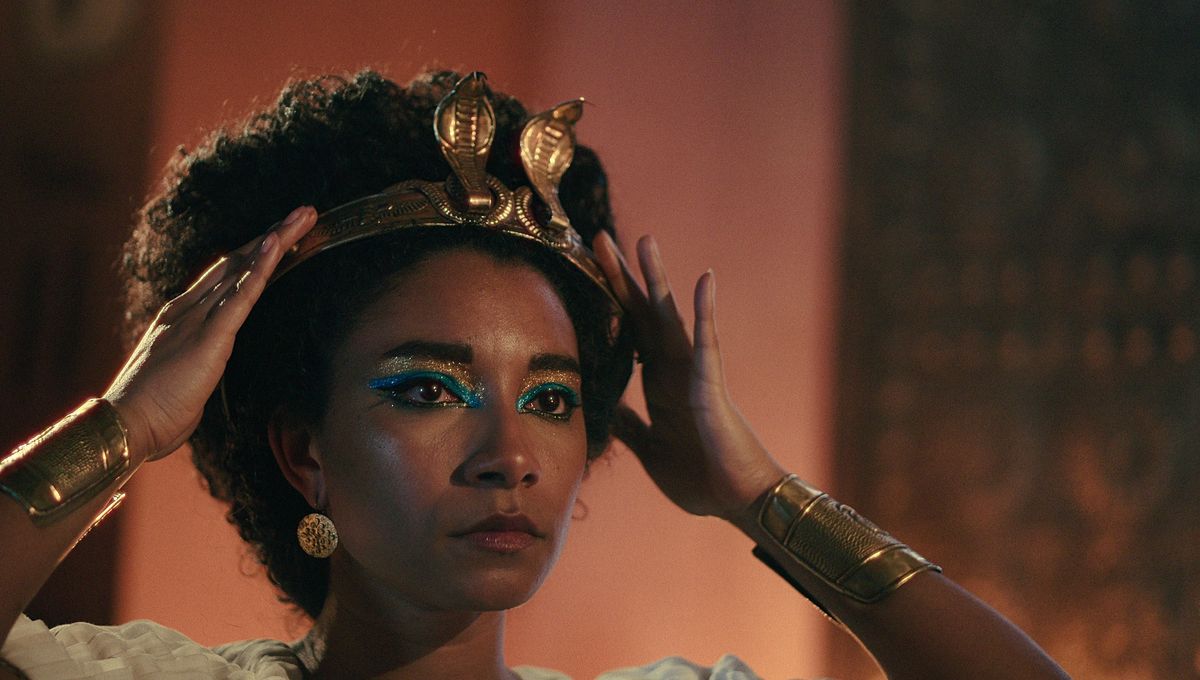
She is one of the most iconic female figures in history. Her name and beauty were so renowned that Shakespeare described her as having “infinite variety”. But a new Netflix docudrama may have found a limit to that famed variety when it reactivated old debates over her race.
Cleopatra VII was queen of the Ptolemaic Kingdom of Egypt who, at the height of her power, ruled virtually the entire eastern Mediterranean coast – from Egypt to Cyprus and parts of modern Libya and other areas in the Middle East. This was effectively the last great kingdom of any Egyptian ruler.
Modern-day representations of Cleopatra have tended to depict her as a woman of great beauty and seductive guile, especially in relation to her romantic involvement with both Julius Caesar and Mark Antony. But in reality, historical evidence shows that Cleopatra was an intelligent and effective pharaoh in her own right, one of the only female rulers in her world to hold power on her own.
Since her famous and dramatic death, Cleopatra has been depicted in innumerous pop culture forms and her name has been appropriated for things such as an asteroid, a video game, cigarettes, a 1990s pop band, strip clubs, and more. But despite all these various appearances, nothing has sparked more controversy than the subject of her “race”.
In April 2023, Netflix launched the trailer for its four-part docudrama Queen Cleopatra, starring Adele James, a Black actress, as the eponymous ruler. The decision to depict Cleopatra as a Black woman has caused anger among some people, especially in Egypt where the former Minister of Antiquities, Zahi Hawass, has stressed that Cleopatra “wasn’t brown”, that she was Macedonian and therefore similar in appearance to other Greek “princesses” at the time.
An Egyptian lawyer has been so outraged by Netflix’s decision that he has filed a complaint accusing the series of violating media laws and aiming to “erase the Egyptian identity”.
Since the controversy began, Adele James has received a string of abusive comments on Twitter, much of which has been explicitly racist and derogatory.
But despite the heated nature of this storm, the reality is that we just don’t know what Cleopatra actually looked like. Moreover, the debate over her “race” is completely ahistorical and says more about contemporary views and anxieties than about historical realities. It draws implicitly (sometimes explicitly) on ideas about racial hierarchies and prejudices that were born in the Enlightenment and would have been utterly meaningless to ancient people.
This debate is also not new and tends to bubble to the surface whenever a high-profile show depicting the historical queen is announced. A few years ago, Angelina Jolie and Lady Gaga inspired a similar dispute when they were identified as the last contenders for the starring role in a biopic of the Egyptian ruler. Similarly, the decision to cast Gal Gadot, an Israeli-born actress as Cleopatra in 2020 also generated outrage.
In academic circles, there have long been debates over whether Cleopatra was an “African” or “Egyptian” (regarded as distinct from Africa more generally) ruler, or a Greek/Macedonian queen. But this also perpetuates modern racial ideas with political overtones that have no place in antiquity. In fact, the claim that she was Macedonian Greek is itself a problematic classification, as it too represents contemporary disputes over the name “Macedonia”.
Ultimately, trying to decide what Cleopatra’s identity was mostly reflects our own political and social realities. The debate obscures more than it reveals about historical people and their complex worlds. As Rebecca Futo Kennedy, Associate Professor of Classical Studies at Denison University wrote in 2020, given the existing political climate “it is much easier to understand why controversy erupts so frequently over Hollywood and television castings. We have competing visions of who Cleopatra is to us. The problem ultimately becomes who is ‘us’?”
Source Link: Netflix Reignites Recurring Controversy Over Cleopatra’s Identity